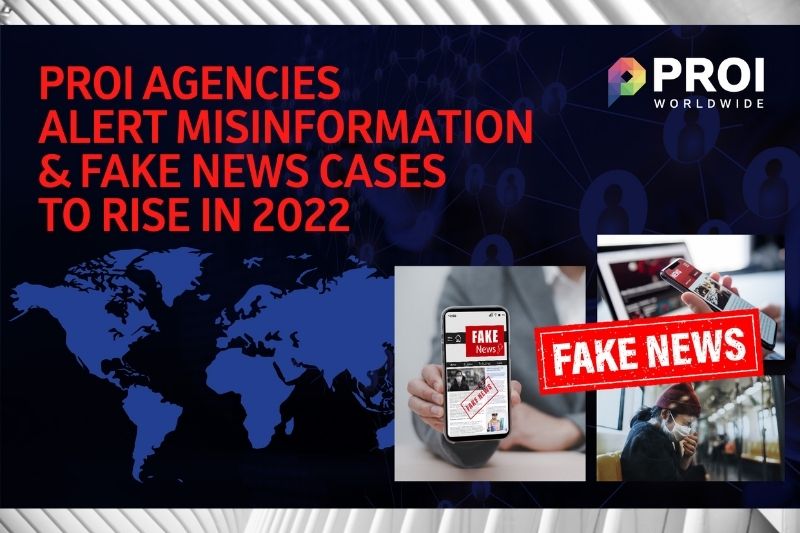17 February 2022, Kuala Lumpur, With the increased use of social media platforms and messaging apps, where information can be publicized in a matter of seconds, PROI Agencies alerted that fake news is here to stay and in fact, the world can expect an increase in fake news and misinformation in 2022.
In general, fake news and misinformation is very damaging to any organisation’s reputation especially if the organisation becomes a target of the spread of false and fabricated news. Fake news can be disguised with the intention to shape opinion or induce bias on targeted public and communities and organisations.
Case in point, a *report published by Facebook, stated that the social media platform removed a network of fake pages and accounts allegedly operated by Myanmar's Mytel and its partner Vietnam’s Viettel Group to criticize their competitors. Mytel and its partner telco reportedly posted critical commentary about their competitors in Myanmar's telco market through 13 fake Facebook accounts and 10 pages to post. The telcos spent almost $1.2 million on Facebook advertisements to spread these fake accounts and pages. Masquerading as independent telco consumer news websites and customers of the competition, these pages and accounts spread disinformation to 265,000 followers and their networks.
**In May 2019, UK’s Metro Bank was the victim of a fake news campaign where news of its supposedly impending shutdown or bankruptcy went viral via the hugely popular WhatsApp messaging app.
*Facebook claims Myanmar telco spent $1.2m on fake accounts to criticise competitors | ZDNet ** The Metro Bank hoax shows the immense power of fake news on WhatsApp | WIRED UK *** (1) New Messages! (checkpoint.com)
Within hours, various bank branches saw panicked customers attempting to withdraw their savings or to empty their safe deposit boxes. The bank’s share price suffered a severe drop due to the negative perceptions and market panic.
“With the proliferation of social media and high internet penetration in Myanmar and the region, misinformation presents an acute and long-term threat to all segments of society here. Awareness of the issue has heightened in recent years, but it is imperative that companies and brands remain vigilant. No organizations are exempted from the impacts of misinformation and taking robust proactive measures against its damaging effects is not only responsible, but also the right thing to do,” said Burhan Omar, Regional Director for Strategic Communications, ERA Communications (Myanmar and Indochine).
There’s no stopping fake news; in fact, fake news and misinformation can grow to become more sophisticated with technology. Throughout 2021, we often witnessed a slew of misinformation surrounding the COVID-19 pandemic and vaccination information.
***According to the Check Point Software 2022 Cyber-security Predictions, the volume of advertisement groups for fake vaccines have multiplied within 2021. This year, cyber groups will continue to leverage these types of fake news campaigns to execute cybercrime through various phishing attacks and scams.
The sophistication and scale of cyberattacks will continue to break records and we can expect a huge increase in the number of ransomware and mobile attacks. As mobile wallets and mobile payment platforms are used more frequently, cybercrimes will evolve and adapt their techniques to exploit the growing reliance on mobile devices.
“Looking ahead, organizations should be cognizant of the threats and ensure that they have in place a crisis preparedness plan that includes fake news and misinformation. It is imperative to stay ahead of threats and be proactive in developing a crisis preparedness plan before a crisis hit. Once it hits, the plan comes to activation, and you’ll have to fix it fast,” said Karin Lohitnavy, Founder and Master Connector, Midas PR Group.
“Organisations confront with issues and crisis including fake news at varying degree. However, when poorly handled no matter the degree of severity; an issue may turn into a full-blown crisis and may worsen to jeopardise the viability of a business,” added Jojo S. Nugroho, Managing Director, Imogen PR (Indonesia).
PROI agencies have consistently proven itself on some of the world and the region’s most demanding strategic crisis communication projects. Our clients include a range of publicly listed international companies, government-owned energy companies, medium sized businesses, start-ups, government departments, and not-for-profit organisations.
“At PROI, the world’s largest partnership of PR agencies, with 75 locally owned, independent consultancies present in 50 countries and 110 cities across the globe, we can deploy and draw a multi disciplinary set of skills, experiences and resource around the globe,” said Lena Soh-Ng, PROI Crisis Group, APAC, Co-Chair and Senior Advisor and Founding Partner of Distilleri (Singapore).
“Planning is absolutely crucial. Planning for fake news attack is comparable to preparing for a media crisis; be prepared for every possible situation, have a competent media team ready, and appoint trained and dedicated spokespeople who deliver a consistent message and response to all queries,” said Doy Roque, M2.0 Communications Inc (Philippines).
*Facebook claims Myanmar telco spent $1.2m on fake accounts to criticise competitors | ZDNet ** The Metro Bank hoax shows the immense power of fake news on WhatsApp | WIRED UK *** (1) New Messages! (checkpoint.com)
“We strongly believe the most effective crisis preparedness plan is achieved through a close and trusted working partnership, where threats are identified, considered and planned for. A clear focus on priority risks, the establishment of a process that allows ongoing transparency of emerging risks, and the continual building of the organisation’s team capability, will fortify a comprehensive Crisis Preparedness Plan,” Elaine Chuah, Executive Director, Priority Communications PR Sdn Bhd (Malaysia).







